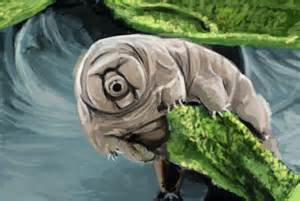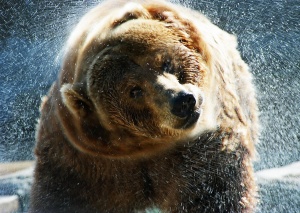It’s been busy around here, which is why I have neglected the blog. And then there was the annual vacation in early July, back from which I traditionally come inspired to break out of the money-driven confines and do some creative work. I do want to get to that, and also I have some things to say about some of the more esoteric, Talmudesque entries in the Chicago Manual of Style, but that is for another day.
Today, I want to consider the tardigrades, microscopic animals also known as water bears or moss piglets. These tiny critters have survived the five major extinction events in our planet’s history; they can withstand temperatures from close to freezing to higher than the boiling point of water. Atmospheric pressure six times greater than that at the bottom of deep ocean trenches, the vacuum of space, radiation lethal to humans—no problem; they can handle it. They can survive for ten years with no food or water and then get right back to the business of eating and reproducing as soon as they are rehydrated.
A testament to perseverance, yes, but when I heard about water bears, the first thing I thought of was not the gorgeous flexibility and tenacity of terrestrial life, but the poor grad students whose job it was to go into the lab every day and try to kill these little buggers. Science is a bitch, sometimes.

What would I know about it, you are no doubt asking. I sit around with a laptop all day reading books. Either the books are good, and I am entertained, or they are abysmal, and I enjoy a deep, satisfying schadenfreude over that. Well, no. (OK, there is a dark sort of joy in exposing and expunging ignorant usage, like “per say”—dude, I know.)
The task that has been wearing on me lately is the repeated exposure to mediocre manuscripts. They are of poor quality not simply because the writers lack vision or talent, but because they have got hold of some idea that all it takes to be an author are several thousand words strung together in a file and a few thousand dollars to PayPal off to a self-pub factory.
This is not a new idea, and people all over several industries have been decrying the self-pub revolution for ages. I don’t care about the dilution of literature so much; no one is reading this deluge of poor fiction, so it doesn’t matter. What concerns me is the attitude, the hubris, that makes fact-checking, revision, the numinous, and honest hard work seem irrelevant. It’s sweatshop work versus craftsmanship.
I recently watched a documentary about this guy, which was well done, but I was most impressed with his use of the phrase “chasing the music.” In music, as in writing, it’s not just daily practice that’s important, or even amassing a body of work, it’s the chasing—the relentless seeking after solutions, hunting the elusive, trying to take down the seemingly unkillable.

Want to write a book? Do it, I implore you. Put the sum of your experience and intelligence into it. Never stop chasing the images and characters in your head. Never give up, and by that I don’t mean the trite advice to push on past naysayers and doubt. When I say never give up, I mean your work isn’t done until it’s polished and awe-inspiring. Write it, fix it, fix it some more. Ask kind souls to read it, and then fix it again after they tell you what’s wrong. If they say nothing’s wrong, get some more truthful readers.
Care about your work. Bring a thoroughness to the job that would make a water-bear-murdering microzoologist proud. No one is going to care about your project the way you do, so put all your passion into it before you unleash it on the world. If you prefer the self-pub route to the agonizing pilgrimage of traditional publishing, that’s fine. Just don’t sign off on something that reads like self-pub, like you wrote it on your phone over your lunch break.
Give your dreams the respect they deserve. Follow your bliss, pursue your excellence, and never stop chasing the words.
